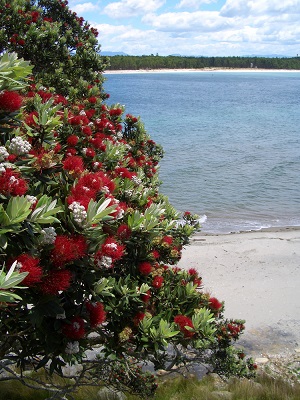Uma Campbell writes about how we can be stewards for our environment and still enjoy the holiday season. She offers us some tips…
Preparing the House for the Holidays
While much of the world might associate the Christmas season with snow and cold weather, Kiwis celebrating the holidays in New Zealand look forward to sun and balmy weather. But while you enjoy the festivities and a meal of perhaps some sliced ham, venison, roast vegetables, and white bait fritters with family and friends, you need to remain a good steward of environment.

Reduce Packaging
If you want to enjoy the festivities of the holidays while reducing the amount of waste you generate, one way to go about this is to use reusable bags as opposed to gift wrapping paper that will ultimately be discarded and clog up landfills. Avoid single-use bags — which have been the subject of much controversy in New Zealand — in favor of the reusable variety. In fact, a poll earlier this year demonstrated that 83% of poll respondents supported doing away with plastic bags, and a Waste Management Institute New Zealand study showed that around two-thirds of people would be in agreement with a plastic bags levy as long as the funds raised were sent to charities. Statistics also show that the number of plastic bags used in New Zealand is 1.6 billion a year, which works out to 348 per person annually. When you consider that a plastic bag is used, on average, for 12 minutes and that each bag requires 1,000 years to break down, you can come to see the importance of using reusable bags more and plastic bags less.
Monitor Use of Appliances
If you will have a full house during the holidays, you might see a bit of a boost to your energy consumption due to the increased use of appliances. But even in this  area, you can potentially conserve energy if you observe a few simple best practices. For instance, you should be mindful of appliances that you leave on stand-buy. Leaving appliances on standby can actually tack in excess of $100 to your energy utility bills annually. So, if you have televisions, computers, video game consoles, stereos and other such things, plug these things into multi-plug boards in order to be able to turn off everything at the same time as required. If you have installed a heated towel rail, be selective about when you actually use it. If it’s on around the clock, you could end up paying out $170 annually because of the energy consumption. Another thing to specifically pay close attention to is the second fridge scenario. Some people have more than one fridge, and this can be useful if you have lots of family and guests over for the holidays, but it could cost your $200 annually to operate it if the second fridge is non-energy efficient. It might make sense to get rid of the second fridge or perhaps to replace it with a more energy efficient one.
area, you can potentially conserve energy if you observe a few simple best practices. For instance, you should be mindful of appliances that you leave on stand-buy. Leaving appliances on standby can actually tack in excess of $100 to your energy utility bills annually. So, if you have televisions, computers, video game consoles, stereos and other such things, plug these things into multi-plug boards in order to be able to turn off everything at the same time as required. If you have installed a heated towel rail, be selective about when you actually use it. If it’s on around the clock, you could end up paying out $170 annually because of the energy consumption. Another thing to specifically pay close attention to is the second fridge scenario. Some people have more than one fridge, and this can be useful if you have lots of family and guests over for the holidays, but it could cost your $200 annually to operate it if the second fridge is non-energy efficient. It might make sense to get rid of the second fridge or perhaps to replace it with a more energy efficient one.
Water Use
Having more people over at your home during the holidays will likely result in the use of more water, and this increased use can have a dramatic impact on your utility bill. Fortunately, there are some things you can do to conserve on water during the holidays. If you reduce shower time, for instance, you can definitely realize cost savings. Consider that a quarter-hour shower costs approximately $1, and a five minute shower costs approximately $0.33. With these water-use estimates, you can get a feel for how much you can potentially save if people shave off time from their regular shower routine. When it comes to washing clothes, you can also use cold water washes rather than hot water washes. Using hot water can take up as much as 10 times more electricity than washing the same load of clothes with cold water. Also remember to wash full loads rather than partially full loads to maximize your energy use.
When the holidays come around in New Zealand this year, you can definitely enjoy the festivities while also playing your part as a conscientious steward of the environment. So, prepare your house for the holidays by reducing packaging, monitoring your use of appliances, and conserving your water use. And be sure to enjoy the festivities!
